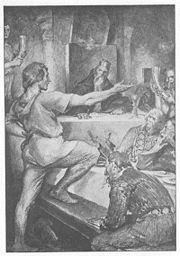
Thyle
Encyclopedia

Scandinavia
Scandinavia is a cultural, historical and ethno-linguistic region in northern Europe that includes the three kingdoms of Denmark, Norway and Sweden, characterized by their common ethno-cultural heritage and language. Modern Norway and Sweden proper are situated on the Scandinavian Peninsula,...
n and Anglo-Saxon
Anglo-Saxons
Anglo-Saxon is a term used by historians to designate the Germanic tribes who invaded and settled the south and east of Great Britain beginning in the early 5th century AD, and the period from their creation of the English nation to the Norman conquest. The Anglo-Saxon Era denotes the period of...
royalty
Royal family
A royal family is the extended family of a king or queen regnant. The term imperial family appropriately describes the extended family of an emperor or empress, while the terms "ducal family", "grand ducal family" or "princely family" are more appropriate to describe the relatives of a reigning...
and chieftains in the Early Middle Ages
Early Middle Ages
The Early Middle Ages was the period of European history lasting from the 5th century to approximately 1000. The Early Middle Ages followed the decline of the Western Roman Empire and preceded the High Middle Ages...
with the duty of determining truth of public statements.. Most literary references are found in Icelandic
Icelandic literature
Icelandic literature refers to literature written in Iceland or by Icelandic people. It is best known for the sagas written in medieval times, starting in the 13th century. As Icelandic and Old Norse are almost the same, and because Icelandic works constitute most of Old Norse literature, Old Norse...
and Anglo-Saxon literature
Anglo-Saxon literature
Old English literature encompasses literature written in Old English in Anglo-Saxon England, in the period from the 7th century to the Norman Conquest of 1066. These works include genres such as epic poetry, hagiography, sermons, Bible translations, legal works, chronicles, riddles, and others...
like the Hávamál
Hávamál
Hávamál is presented as a single poem in the Poetic Edda, a collection of Old Norse poems from the Viking age. The poem, itself a combination of different poems, is largely gnomic, presenting advice for living, proper conduct and wisdom....
, where Odin
Odin
Odin is a major god in Norse mythology and the ruler of Asgard. Homologous with the Anglo-Saxon "Wōden" and the Old High German "Wotan", the name is descended from Proto-Germanic "*Wodanaz" or "*Wōđanaz"....
himself is called "the great thul", and Beowulf
Beowulf
Beowulf , but modern scholars agree in naming it after the hero whose life is its subject." of an Old English heroic epic poem consisting of 3182 alliterative long lines, set in Scandinavia, commonly cited as one of the most important works of Anglo-Saxon literature.It survives in a single...
. It also appears on the runic inscription of the Snoldelev Stone
Snoldelev Stone
The Snoldelev Stone, listed as DR 248 in the Rundata catalog, is a 9th century runestone that was originally located at Snoldelev, Ramsø, Denmark.-Description:...
.
The Old English term is glossed as Latin histrio "orator" and curra "jester"; þylcræft means "elocution
Elocution
Elocution is the study of formal speaking in pronunciation, grammar, style, and tone.-History:In Western classical rhetoric, elocution was one of the five core disciplines of pronunciation, which was the art of delivering speeches. Orators were trained not only on proper diction, but on the proper...
". Zoega's Concise Dictionary of Old Icelandic defines Þulr as "wise-man, sage," cognate to Old Norse þula (verb) "to speak" and 'þula (noun) "list in poetic form". The Rundata
Rundata
The Scandinavian Runic-text Data Base is a project involving the creation and maintenance of a database of runic inscriptions. The project's goal is to comprehensively catalog runestones in a machine-readable way for future research...
project translates Þulr as "reciter". From this it appears that the office of thyle was connected to the keeping and reproducing of orally transmitted lore, like Rigsthula (= Rig's song).
The thyle may further have served the function of challenging those who would make unwise boasts or oaths and possibly hurt the luck
Luck
Luck or fortuity is good fortune which occurs beyond one's control, without regard to one's will, intention, or desired result. There are at least two senses people usually mean when they use the term, the prescriptive sense and the descriptive sense...
of the community, and consequentially the reputation of the king. Unferth, holds the role of thyle in the poem Beowulf
Beowulf
Beowulf , but modern scholars agree in naming it after the hero whose life is its subject." of an Old English heroic epic poem consisting of 3182 alliterative long lines, set in Scandinavia, commonly cited as one of the most important works of Anglo-Saxon literature.It survives in a single...
, so that his questioning of Beowulf's statements may have been part of his office, rather than motivated by petty antagonism.
Some modern scholars view the role of the thyle as being usurped by monks after Christianization
Christianization
The historical phenomenon of Christianization is the conversion of individuals to Christianity or the conversion of entire peoples at once...
, and being reduced to the modern caricature of the court jester (hence the Latin gloss of curra).
Modern adherents of the reconstructionist
Polytheistic reconstructionism
Polytheistic reconstructionism is an approach to Neopaganism first emerging in the late 1960s to early 1970s, and gathering momentum in the 1990s to 2000s...
religion Theodism have instituted the role of thyle in their organizations.
External links
- The Office of Þyle - essay by Eric Wodening
- Oaths:What They Mean and Why They Matter - essay by Winifred Hodge

